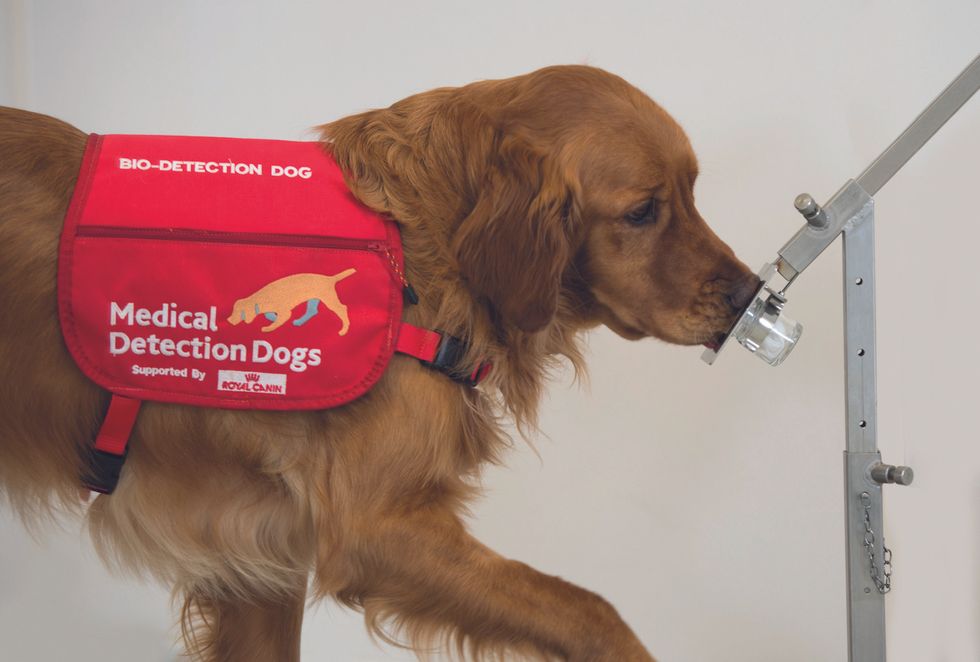New hope for Parkinson's patients as trained dogs can detect condition with 98% accuracy – years before symptoms start

A timely diagnosis could slow down the progression of the disease and reduce the intensity of symptoms
Don't Miss
Most Read
Trained dogs have demonstrated an extraordinary ability to identify Parkinson's disease years before clinical symptoms emerge, achieving up to 98 per cent accuracy in groundbreaking research.
A new study, published in The Journal of Parkinson's Disease, revealed that dogs could detect the condition from skin swabs with 80 per cent sensitivity.
This remarkable discovery emerged from a collaboration between Medical Detection Dogs and the Universities of Bristol and Manchester.
The findings suggest a potential breakthrough in early diagnosis, as the disease can develop silently for up to two decades before visible symptoms prompt medical attention.
The research employed a rigorous double-blind trial design, where only a computer knew the location of the correct samples. Each line of samples was presented in reverse order, ensuring all samples received evaluation.
The dogs achieved between 70 per cent and 80 per cent sensitivity in detecting Parkinson's from skin swabs, whilst maintaining 98 per cent specificity. (Sensitivity is the ability of a test to correctly identify patients with a disease, while specificity is the ability of a test to correctly identify people without the disease.)
This performance remained consistent even when other health conditions were present in the test subjects.
The methodology involved collecting any unsearched samples into new lines until decisions had been made for all samples.

People with Parkinson's disease often have stiff and inflexible muscles
|GETTY IMAGES
This comprehensive approach ensured thorough testing of the dogs' detection capabilities across the entire sample set.
Claire Guest, Medical Detection Dogs CEO and chief scientific officer, commented: "We are extremely proud to say that once again, dogs can very accurately detect disease.
"There is currently no early test for Parkinson's disease, and symptoms may start up to 20 years before they become visible and persistent, leading to a confirmed diagnosis.
"Timely diagnosis is key as subsequent treatment could slow down the progression of the disease and reduce the intensity of symptoms."
LATEST DEVELOPMENTS:

The trained dogs showed sensitivity of up to 80% and specificity of up to 98%
| Medical Detection DogsLead author Nicola Rooney, an associate professor at Bristol Veterinary School, University of Bristol, added: "Identifying diagnostic biomarkers of PD, particularly those that may predict development or help diagnose disease earlier, is the subject of much ongoing research.
"The dogs in this study achieved high sensitivity and specificity and showed there is an olfactory signature distinct to patients with the disease.
"Sensitivity levels of 70 per cent and 80 per cent are well above chance, and I believe that dogs could help us to develop a quick, non-invasive, and cost-effective method to identify patients with Parkinson's disease."
Professor Perdita Barran of The University of Manchester's Mass Spectrometry department said: "It's wonderful to be part of this research inspired by Joy Milne and our Nose2Diagnose programme.
"This study adds to the growing body of evidence showing that simple, non-invasive skin swabs can be used to diagnose Parkinson's disease, offering a faster and more accessible method for early detection."
The research builds upon previous work exploring olfactory biomarkers for neurological conditions.
The detection team comprised two specially trained dogs: Bumper, a Golden Retriever, and Peanut, a Black Labrador.
The absence of definitive diagnostic tests for Parkinson's has long challenged medical professionals, making these findings particularly significant for future diagnostic development.
Symptoms of Parkinson's disease
Main symptoms of Parkinson's disease
- Involuntary shaking of particular parts of the body (tremor)
- Slow movement
- Stiff and inflexible muscles
Other physical and psychological symptoms that patients may experience
- Depression and anxiety
- Balance problems (this may increase the chances of a fall)
- Loss of sense of smell (anosmia)
- Problems sleeping (insomnia)
- Memory problems
For further information on Parkinson's disease, including when to seek medical advice, who is affected, causes, treatments, support, and outlook.











